As Russian Officials Reject Ukrainian Government’s Legitimacy After Putin-Trump Call, EU and UK Impose New Sanctions While Battlefield Advances Continue
Summary of the Day – May 20, 2025
One day after Trump’s “productive” call with Putin supposedly set the stage for peace negotiations, Moscow’s true intentions became clear as Russian Security Council Secretary Dmitry Medvedev declared no Ukrainian official has authority to conclude a peace treaty. The stark contradiction exposed the Kremlin’s continued refusal to recognize Ukraine’s elected government, with Medvedev demanding Ukraine’s complete demilitarization, rejection of foreign aid, and cession of annexed territories. President Zelensky accused Russia of merely “buying time to continue the war,” while European powers moved forward with substantive action, the EU approving its 17th sanctions package targeting nearly 200 shadow fleet vessels, and the UK imposing 100 new measures against Russian entities. On the battlefield, Russian forces continued advancing in multiple sectors including Sumy, Kharkiv, Chasiv Yar, and Zaporizhia directions.
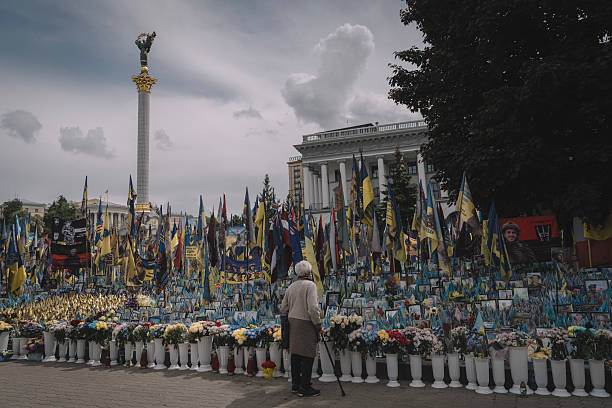
A woman visits a memorial for the fallen Ukrainian and foreign fighters on Kyiv’s Independence Square. (Andrew Kravchenko/Global Images Ukraine via Getty Images)
Russia’s True Position: Medvedev Denies Ukrainian Government’s Legitimacy
Senior Russian officials continue to deny the legitimacy of the Ukrainian president, government, and constitution and Ukraine’s sovereignty despite Russian President Vladimir Putin’s recent efforts to feign interest in peace negotiations to end the war. Russian Security Council Secretary Dmitry Medvedev claimed during the St. Petersburg International Legal Forum on May 20 that there are currently no Ukrainian officials with the authority to conclude a peace treaty with Russia and that Russia may need to consult Ukraine’s Constitution to identify authorized negotiation partners.
Medvedev questioned Ukraine’s sovereignty and claimed that Ukraine is a “failed state” whose leaders’ lack of legitimacy raises “serious questions” about who Russia can negotiate with during future peace negotiations. Medvedev’s claims directly contradict Putin’s reported agreement with US President Donald Trump to immediately begin bilateral negotiations with Ukraine. Medvedev’s statements indicate that Russia is, in fact, not interested in engaging with Ukrainian President Volodymyr Zelensky and other senior Ukrainian government officials who are key to bilateral negotiations to end the war.
Russian officials have repeatedly promoted the false narrative that Zelensky and the Ukrainian government are illegitimate to justify Russia’s refusal to engage in good-faith negotiations with Ukraine and further Russia’s long-standing war goal of establishing a pro-Russian puppet government in Kyiv.
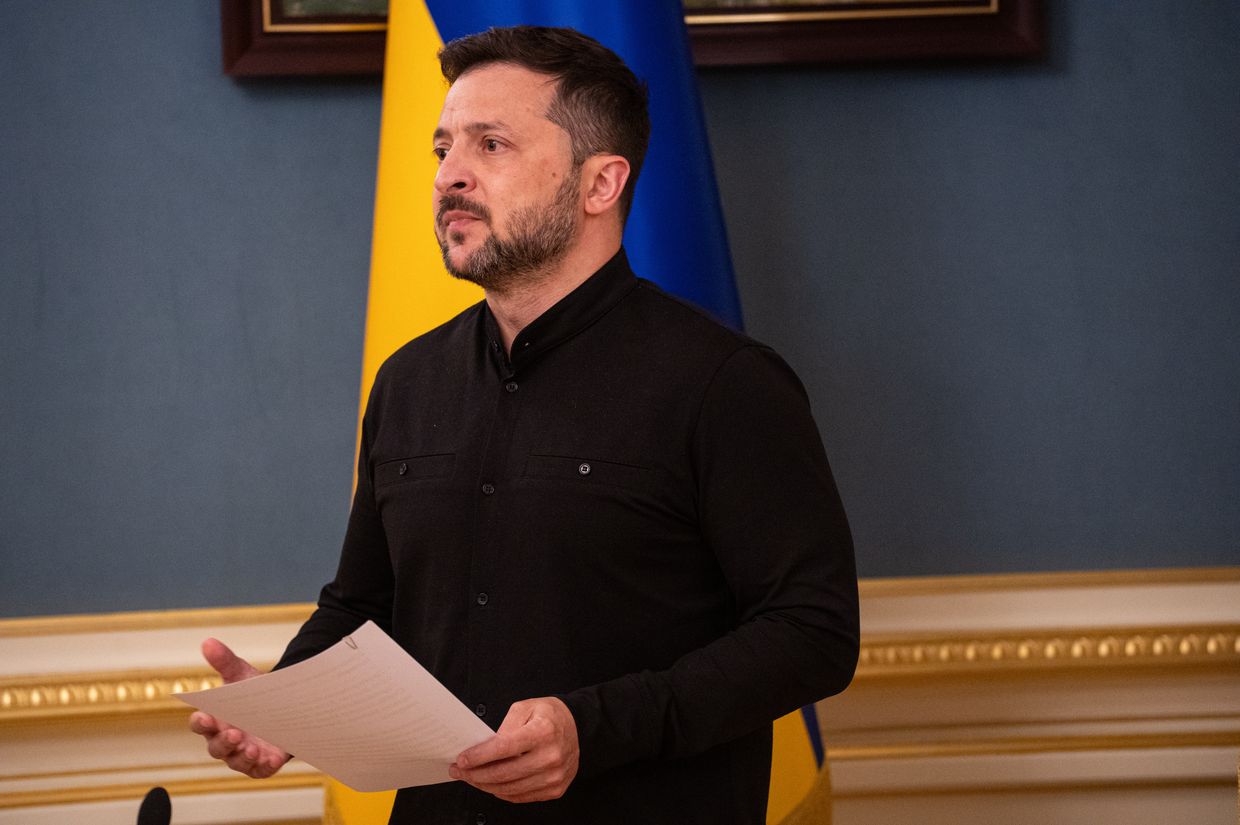
President Volodymyr Zelensky speaks at a press conference following a phone conversation with U.S. President Donald Trump in Kyiv, Ukraine (Danylo Antoniuk/Anadolu via Getty Images).
Maximalist Demands: Russia Seeks Ukraine’s Complete Capitulation
Medvedev also reiterated long-standing Russian demands tantamount to Ukraine’s complete capitulation. Medvedev falsely claimed that Russia’s illegal annexation of Donetsk, Luhansk, Zaporizhia, and Kherson oblasts and Crimea was legitimate under international law, underscoring Russia’s unwillingness to make any concessions in peace negotiations to end the war in Ukraine.
Medvedev also demanded that Ukraine demilitarize the current frontline, refuse foreign military aid, and reject European peacekeeping deployments to Ukraine. Medvedev stated that Russia would consider the deployment of European forces to be a military threat and categorize future deployments of European forces in Ukraine as legitimate military targets.
Medvedev’s statements indicate that Russia has not abandoned its original goals in Ukraine, which include the “demilitarization” and “denazification” of Ukraine, securing international recognition of large parts of southern and eastern Ukraine as Russian territory, and a permanent non-aligned status for Ukraine. Medvedev’s threats against future European peacekeepers are also part of an ongoing effort to frame the current war in Ukraine as an existential conflict between Russia and the West.
European Sanctions Escalate: EU and UK Target Russian War Machine
The European Union and the United Kingdom announced several sanctions packages against Russia on May 20. The package is the EU’s largest targeting Russia’s shadow fleet and the Russian energy and military-industrial sector. The EU also sanctioned the Russian Radiological, Chemical, and Biological Defense Troops; the 27th Scientific Center; and the Russian Ministry of Defense’s 33rd Central Scientific Research and Testing Institute for Russia’s use of chemical weapons in Ukraine. The UK also announced new sanctions against Russia’s military, energy, and financial sectors on May 20.
“New measures also address hybrid threats and human rights. More sanctions on Russia are in the works,” EU diplomatic chief Kaja Kallas said on X. The package was supported by EU ambassadors last week, but has since then been criticized as weak and watered down.
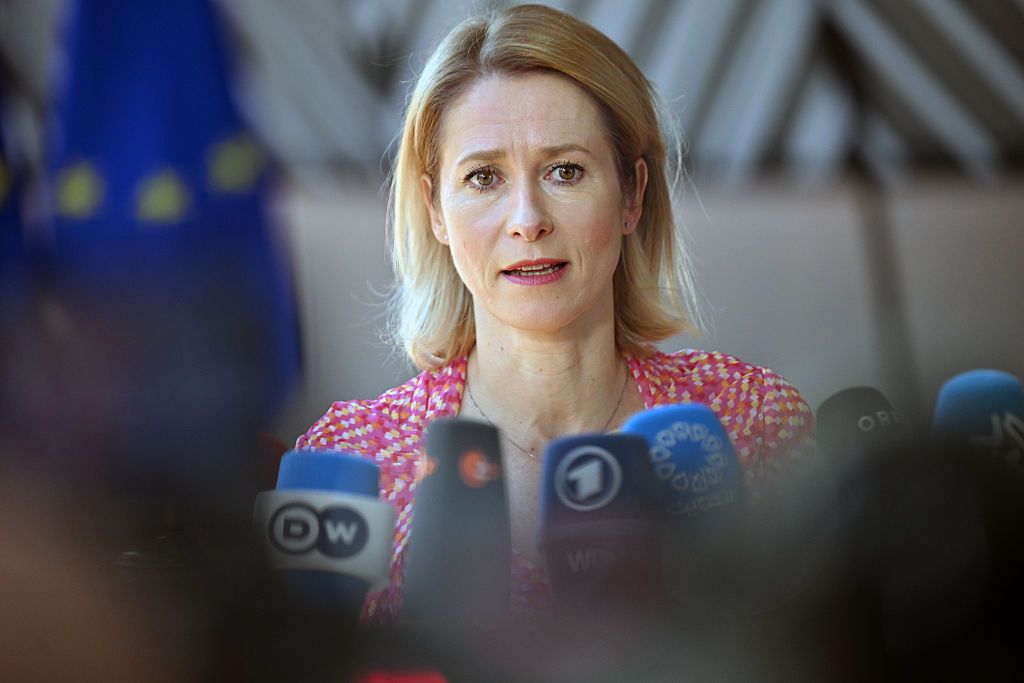
EU High Representative for Foreign Affairs and Security Policy Kaja Kallas attends the European Union Defence Ministers Meeting in Brussels. (Photo by Dursun Aydemir/Anadolu via Getty Images)
The new sanctions target members of Russia’s military and political elite and foreign entities in China or the United Arab Emirates, accused of helping the Kremlin evade already-imposed measures. The EU will also sanction more than 20 entities and individuals disseminating disinformation, and 20 judges and prosecutors involved in legal cases against Russian opposition, specifically Vladimir Kara-Murza and late Alexei Navalny.
The British government announced 100 new sanctions against Russia on May 20, pledging to ramp up pressure as Moscow continues to reject a ceasefire in Ukraine. The sanctions further target 18 shadow fleet vessels, 46 financial institutions helping Russia evade sanctions, and measures to prevent Russia from reconnecting to the global economy. The UK further said it is reviewing the possibility of further lowering the $60-per-barrel price cap imposed on Russian crude oil.
Zelensky Responds: “Russia Buying Time to Continue War”
President Volodymyr Zelensky accused Russia of trying to buy time to continue its war in Ukraine, reacting to the recent call between US President Donald Trump and Russian President Vladimir Putin.
“It is obvious that Russia is trying to buy time to continue the war and occupation,” Zelensky said on X. “We are working with our partners to pressure the Russians to change their behavior.”
Zelensky thanked partners who continue to impose sanctions on Russia for its aggression in Ukraine and stressed that the war should end at the negotiating table. “Clear and realistic proposals must be on the table. Ukraine is ready for any effective negotiation format. And if Russia continues to put forward unrealistic conditions and undermine possible results, there must be harsh consequences,” Zelensky said.
Ukrainian presidential advisor Mykhailo Podolyak stated that following the Trump-Putin phone call, the status quo has not changed. “Unfortunately, following the Trump-Putin phone call, the status quo has not changed,” Podolyak wrote on X, adding that Ukraine continues to offer an immediate and unconditional ceasefire, while Europe fully supports this step.
Trump’s Indifference: “I Don’t Worry” About Russian Military Buildup
US President Donald Trump dismissed concerns about Russian military buildup along Finland and Norway’s borders during comments to reporters at the White House on May 20. When asked about the threat, Trump responded: “No, I don’t worry about that at all. They’re going to be very safe. Those two countries are going to be very safe.”
This statement comes despite recent New York Times reporting, confirmed by NATO officials, showing that Russia is building bases and military infrastructure near the Finnish and Estonian borders, including tents, vehicle storage warehouses, fighter jet shelters, and helicopter bases at multiple locations in Russia’s northwest.
Trump also said that the decision to strengthen sanctions on Russia over its refusal of a ceasefire is “going to be my determination — that’s going to be nobody else’s determination.” He added: “We’ll see how Russia behaves. We see what’s going to happen,” continuing: “You know, we have a pretty critical time right now. I had a talk yesterday for two and a half hours with President Putin… I also spoke to all of the European — to many of them — leaders, but they were representing the whole [of Europe]. And I think we had a very good conversations [sic] yesterday.”
Military Advances: Russian Forces Push Forward in Multiple Sectors
Russian forces recently advanced in Sumy and Kharkiv oblasts, near Chasiv Yar and Toretsk, and in the Zaporizhia direction.
In Sumy Oblast, geolocated footage published on May 19 shows that Russian forces advanced within southwestern Loknya (northeast of Sumy City) and seized the fields west of the settlement. Russian forces continued attacks within Loknya and near Bilovody and Vodolahy on May 19 and 20.
In Kharkiv Oblast, geolocated footage published on May 20 indicates that Russian forces recently advanced across the Vovcha River in northwestern Vovchansk (northeast of Kharkiv City), though it is unclear if Russian forces maintain positions in this area. Russian forces continued assaults near Vovchansk on May 19 and 20.
In the Chasiv Yar direction, geolocated footage published on May 20 shows that Russian forces recently advanced north of Kalynivka (north of Chasiv Yar). The spokesperson of a Ukrainian brigade operating in the Chasiv Yar direction reported that Russian forces have been accumulating forces in Chasiv Yar for an unspecified period of time and are now leveraging this larger force grouping to attempt to break out of the settlement. The spokesperson reported that Russian forces are actively attempting to raze buildings in central Chasiv Yar in order to facilitate further advances.
In the Toretsk direction, geolocated footage published on May 19 indicates that Russian forces recently advanced in western Toretsk and east of Nova Poltavka along the T-0504 Pokrovsk-Kostyantynivka highway. Additional geolocated footage published on May 20 indicates that Russian forces recently marginally advanced north of Toretsk.
In the Zaporizhia direction, geolocated footage published on May 19 indicates that Russian forces recently advanced southwest of Bilohirya (southeast of Orikhiv).
Command Changes: Russia Appoints New Military District Leader
The Russian Ministry of Defense confirmed Colonel General Valery Solodchuk’s recent appointment as Central Military District commander on May 20. Solodchuk most recently served as commander of the Kursk Grouping of Forces and led Russia’s efforts to eliminate the Ukrainian salient in Kursk Oblast. Solodchuk is replacing Colonel General Andrei Mordvichev, who reportedly recently replaced General Oleg Salyukov as Russian Ground Forces Commander.
Western Aid Continues: Military Support for Ukraine
Ukraine’s Western allies continue to provide military aid to Ukraine and support Ukraine’s defense industry. Italian media reported in mid-May 2025 that Italian Defense Minister Guido Crosetto announced that Italy approved an eleventh military aid package for Ukraine, which will include one SAMP/T air and missile defense system, 400 M-113 armored personnel carriers, and ammunition.
Ukrainian state-owned defense enterprise manager Ukroboronprom reported on May 20 that it signed a memorandum of cooperation with Belgian ammunition manufacturer KNDS Belgium to coordinate the joint assembly of medium-caliber ammunition for automatic cannons.
Prime Minister Denys Shmyhal announced that Ukraine will receive 400,000 additional artillery shells in 2025 through the Czech-led munitions initiative. Following a meeting with Czech Prime Minister Petr Fiala, Shmyhal said Ukraine received around 1.5 million artillery shells of various calibers through the initiative in 2024.
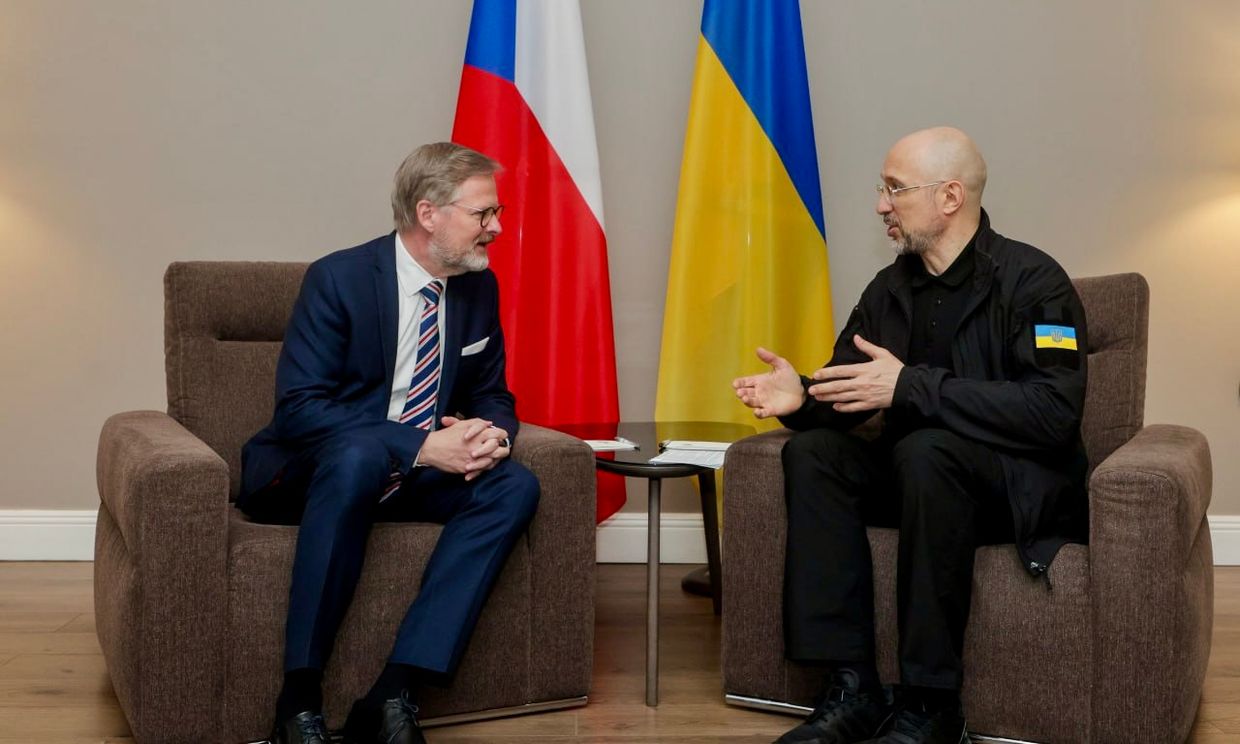
Ukraine’s Prime Minister Denys Shmyhal met with Czech Prime Minister Petr Fiala, to discuss weapons production and economic and humanitarian assistance (Denys Shmyhal / Telegram).
Bipartisan Initiative: US Senators Demand Return of Abducted Children
In a rare display of bipartisan unity, a group of US senators has introduced a resolution calling for the return of thousands of Ukrainian children abducted by Russia, urging that no peace agreement to end the war in Ukraine be finalized until all minors are safely repatriated.
The resolution condemns what it describes as Russia’s systematic abduction, forced transfer, and illegal deportation of Ukrainian children. It states that “Russia’s abduction and Russification of Ukrainian children demonstrate Russia’s intent to erase the Ukrainian nation and identity.”
The effort is being led by a group of six senators, including Republicans Charles E. Grassley, Roger Wicker, Joni Ernst, and Rick Scott, and Democrats Amy Klobuchar, Dick Durbin and John Fetterman.
According to Ukrainian authorities, as of April 16, more than 19,500 children have been confirmed as unlawfully deported or forcibly transferred to Russia, Belarus, or areas of Ukraine under Russian occupation. So far, only 1,274 have been returned to Ukrainian-controlled territories.
Russian Mobilization Tactics: 20,000 Migrants Sent to Front
Russian law enforcement agencies have sent 20,000 naturalized migrants to fight in Ukraine for failing to register for military service, Investigative Committee Head Alexander Bastrykin said on May 20, according to state-owned TASS.
“Already 20,000 ‘young’ citizens of Russia, who for some reason do not like living in Uzbekistan, Tajikistan, Kyrgyzstan, are on the front lines,” Bastrykin said during the St. Petersburg International Legal Forum.
He said he had ordered military investigators, police, and Russia’s National Guard to conduct regular raids on areas where migrants live to catch those evading military registration. Bastrykin earlier claimed many foreigners had begun “slowly” leaving Russia to avoid conscription and described the forced deployment of naturalized citizens as a “trick” to target migrants while fulfilling constitutional requirements.
G7 Finance Ministers Meet: Ukraine War on the Agenda
Finance leaders from the Group of Seven nations (G7) began meetings on May 20 in Banff, Alberta, Canada, facing growing uncertainty over the war in Ukraine and the economic fallout from US President Donald Trump’s new trade tariffs.
The talks, running through Thursday, bring together finance ministers and central bank governors from Canada, France, Germany, Italy, Japan, the United Kingdom and the United States. Ukrainian Finance Minister Serhii Marchenko is also attending.
US Treasury Secretary Scott Bessent is expected to focus on trade imbalances and seek common ground on issues such as China’s industrial policies, while Canadian Finance Minister Francois-Philippe Champagne will co-chair sessions on the global economy, financial crime, AI, and support for Ukraine.
A source briefed on US participation in the meeting reported that the White House is not inclined to “do a communique just for the sake of doing a communique,” with any consensus needing to align with Trump administration priorities.
German Trial Begins: Russian Sabotage Plot Uncovered
Three German-Russian dual nationals are going on trial in Munich on May 20, accused of spying for Moscow and readying attacks on critical military infrastructure and industry in Germany.
The main suspect, identified only as Dieter S., is said to have been at the center of a plot to undermine Germany’s support for Ukraine through acts of sabotage aimed at targets including US military bases. He will be tried alongside Alexander J. and Alex D., who are alleged to have supported his activities on behalf of a foreign intelligence service.
Dieter S. faces further charges for allegedly “taking images of military installations” and “conspiracy to cause an explosion and arson”. Prosecutors have also charged him with “membership in a foreign terrorist organization” for allegedly fighting for a pro-Russian militia in eastern Ukraine between 2014 and 2016.
According to prosecutors, the suspect allegedly “declared his willingness to carry out explosive and arson attacks on military infrastructure and industrial sites” and to sabotage railway lines used to transport military goods. Dieter S. is said to have scouted out potential targets in Germany, including US military installations, a loading station and a tool manufacturing company.
Polish Indictment: Plot to Assassinate Zelensky Uncovered
Polish prosecutors have indicted a man charged with allegedly planning to assist Russian foreign intelligence in a possible assassination attempt on President Volodymyr Zelensky, authorities announced on May 20.
The person charged, identified as Pawel K., was arrested on April 17, 2024 in Poland following a joint investigation by Polish and Ukrainian authorities. He faces up to eight years in prison, according to a press release from Poland’s National Prosecutor’s Office.
According to investigators, Paweł K. expressed willingness to work for Russian military intelligence and established contact with Russian citizens directly involved in the war in Ukraine. His tasks included collecting and providing information on security at the Rzeszow-Jasionka Airport in southeastern Poland, authorities said.
The press release also said that Pawel K.’s activities “were to help, among other things, in planning by the Russian special services a possible assassination attempt on the life of… the President of Ukraine Volodymyr Zelensky.”
Hungarian Controversies: ICC Withdrawal and Espionage Claims
The Hungarian parliament on May 20 supported a bill on launching Hungary’s withdrawal from the International Criminal Court (ICC). The government-proposed bill, supported by 134 lawmakers, would see Hungary exit the international body that it co-founded in 2002. The Hague-based court is tasked with prosecuting international crimes of genocide, war crimes, or crimes against humanity.
The vote formalizes Hungary’s intention, which was first announced in early April during Israeli Prime Minister Benjamin Netanyahu’s visit to Budapest. The Hungarian government has sharply criticized the ICC’s decision to issue an arrest warrant for the Israeli leader over alleged war crimes in Gaza.
In March 2023, the ICC issued an arrest warrant for Russian President Vladimir Putin over the forcible deportation of children from Russian-occupied areas of Ukraine, a move that may have influenced Hungary’s decision.
In a separate development, Hungarian intelligence services have claimed to uncover two alleged Ukrainian “spies,” Hungarian government spokesperson Zoltan Kovacs wrote on the social media platform X on May 20. Kovacs said that Hungary’s Fidesz party identified the individuals as Roland Tseber and Istvan Hollo, claiming Tseber was “an illegal officer of Ukrainian intelligence” who built ties with opposition figures to influence Hungary’s position on Russia’s war.
The new allegations escalate a diplomatic row sparked by mutual espionage accusations between Kyiv and Budapest, following Ukraine’s Security Service claim on May 9 that it had exposed a Hungarian espionage network in western Ukraine.
ICC Investigation Possibility: Kim Jong Un Could Face Charges
North Korean dictator Kim Jong Un could be investigated by the International Criminal Court (ICC) for supporting Russia’s war against Ukraine, Song Sang-hyun, former president of the ICC, said on May 20, Yonhap reported.
“There is an opportunity for Ukrainian authorities, as the victim, to file a complaint against North Korea with the ICC,” Song said. “While a complaint filed by Ukraine would be ideal, the ICC also has the authority to initiate an independent investigation.”
Song’s statement comes as North Korea confirmed in late April for the first time that it had sent troops to fight against Ukraine alongside Russian forces in Kursk Oblast. Despite numerous human rights violations in North Korea, the ICC has not indicted Kim. However, as of now, there are sufficient legal grounds for Ukraine to initiate a case against him for assisting Russia in waging the war, according to the former ICC chief.
“The time is right to bring Kim Jong Un before the ICC,” Song said at an international conference in Seoul, adding that North Korean military assistance to Russia is grounds for filing a complaint against Pyongyang.
NATO Territory Visit: Norwegian Crown Prince in Ukraine
Crown Prince Haakon of Norway arrived in Ukraine on May 20, marking the first visit by a member of the Norwegian royal family during Russia’s invasion. The Norwegian heir to the throne arrived by train on the morning of May 20, accompanied by Norwegian Energy Minister Terje Aasland.
Haakon met President Volodymyr Zelensky, who voiced gratitude for “this meaningful gesture of attention and support for our people.” “We appreciate the $450 million contribution of Norway to Ukraine’s energy security,” Zelensky said. “We also touched on deepening cultural ties between our nations and investment in the defense sector. There is strong potential in all these areas.”
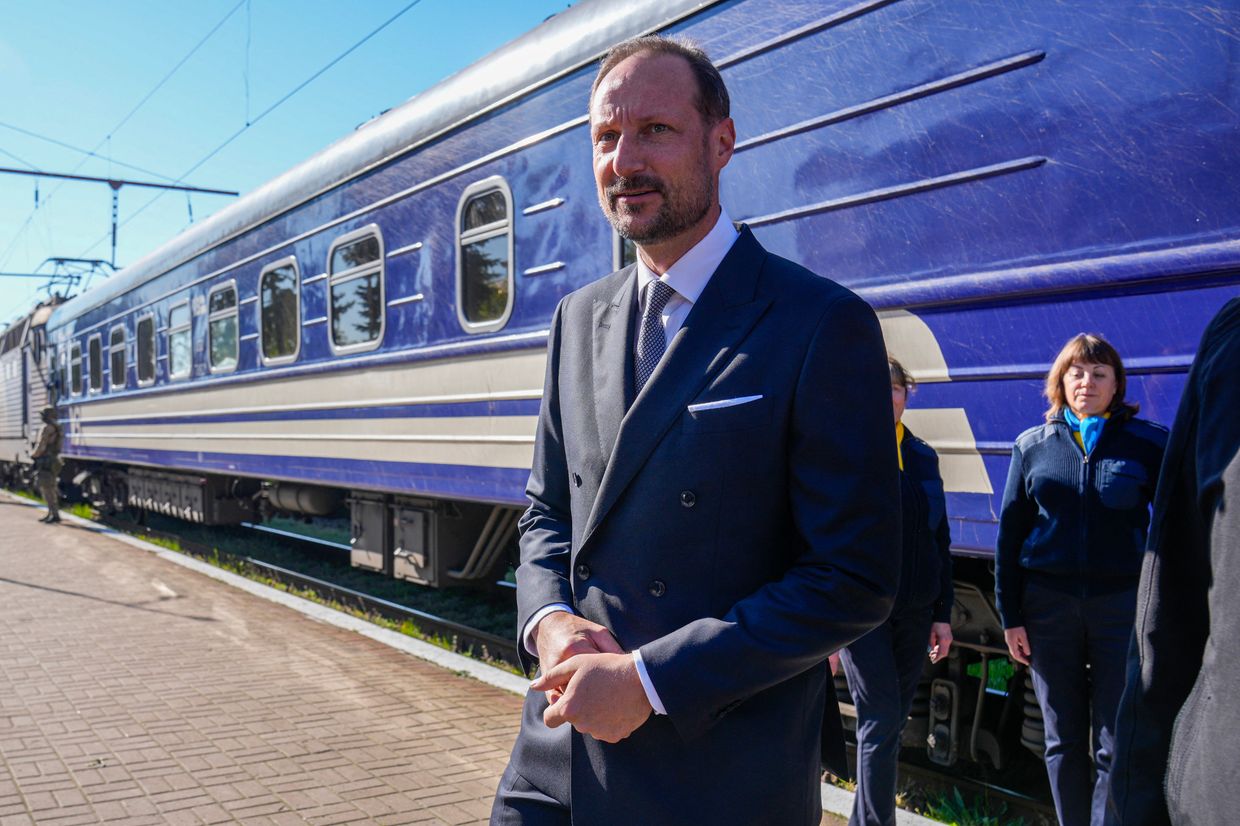
Crown Prince Haakon of Norway arrives at the train station in Kyiv, Ukraine. The Crown Prince and Norwegian Energy Minister Terje Aasland are visiting the war-torn country to emphasize Norway’s support. (Heiko Junge / NTB / AFP via Getty Images)
As part of his visit, the crown prince also visited a memorial for fallen soldiers in Moshchun in Kyiv Oblast and a hospital in Irpin to meet injured Ukrainian soldiers. “The visit is an expression of Norway’s strong and ongoing support for the Ukrainian government and people,” the Norwegian Royal House said in a statement.
Ukrainian Brigade Investigation: Corruption Allegations Surface
Ground Forces Commander Mykhailo Drapatyi ordered an inspection of the scandal-hit Ukrainian 155th “Anne of Kyiv” Brigade following misconduct allegations within the brigade’s command, Ukrainska Pravda reported on May 20.
Drapatyi issued a written statement after the outlet published an investigation into a possible involvement of the brigade’s commander, Colonel Taras Maksimov, in handing out falsified bonus payments and demanding bribes. The investigation also noted over 1,200 cases of personnel going absent without official leave (AWOL) since 2025 and failure to sufficiently supply the unit.
The Western-trained brigade had previously faced a scandal in 2024, where a media investigation uncovered rampant mismanagement and desertion among the personnel, leading to an inspection and a command change.
“Whatever the achievements, I will not cover for anyone — there are no untouchables for me. I’m waiting for the results of all the inspections and what the investigation will find,” Drapatyi said, adding that the investigation by the State Bureau of Investigation (DBR) is still ongoing.
Trump Administration Plans: Potential Deportation of 200,000 Ukrainians
Washington plans to spend about $250 million of foreign aid funds to repatriate people from active conflict zones, including about 200,000 Ukrainians and 500,000 Haitians, the Washington Post reported on May 20, citing draft internal documents the newspaper obtained.
During Joe Biden’s presidency, Ukrainians and Haitians were granted temporary protection, allowing them to stay in the U.S. if they could not return to their home country. With the Trump administration coming to office, the U.S. has tightened its immigration policy.
According to the draft internal documents, the proposal was prepared after the Department of Homeland Security issued a statement on May 5. The statement read that those immigrants who voluntarily leave the U.S. for their home countries would be eligible for $1,000 in assistance.
Tricia McLaughlin, the U.S. Department of Homeland Security spokesperson, verified the documents’ authenticity, but described them as “outdated.” McLaughlin added that Homeland Security Secretary Kristi Noem has not made a “final” decision on temporary protected status for Haiti or Ukraine.
Estonian Tanker Released: Maritime Tensions in Baltic
Moscow released the oil tanker Green Admire on May 19, a day after detaining the vessel in Russian territorial waters as it transited from Estonia, Estonian Public Broadcasting (ERR) reported on May 20.
The detention followed recent moves by Estonia and its neighbors to clamp down on Russia’s so-called “shadow fleet,” which is used to bypass Western oil sanctions. The Green Admire, a Liberian-flagged vessel owned by a Greek company, departed the Estonian port of Sillamae on May 18 carrying shale oil.
Its route — agreed upon in advance by Estonia, Russia, and Finland — crossed Russian territorial waters, where it was intercepted by Russian authorities. Estonian officials said the ship had followed its planned navigation route but was seized after allegedly failing to respond to repeated Russian warnings upon entering a zone Moscow had unilaterally declared “dangerous for navigation.”
Estonia’s Foreign Minister Margus Tsahkna said the detention was likely tied to growing pressure on Russia’s shadow fleet, which Western nations have accused of illegally transporting oil in defiance of international sanctions.
Ukrainian Drone Intercepts: Russia Adapts Strike Tactics
Ukrainian Air Force Spokesperson Colonel Yuriy Ihnat reported on May 19 that Russian forces are continuing to innovate their long-range strike tactics and recently began massing Shahed strike drones at high altitudes before striking targets in Ukraine, complicating Ukraine’s ability to intercept the drones. Ihnat reported that Russian forces are also complicating the work of Ukrainian mobile air defense units by using decoy drones in combination with Shahed drones during strikes.
Russian forces conducted a series of drone strikes against Ukraine overnight on May 19 and 20. The Ukrainian Air Force reported that Russian forces launched 108 Shahed and decoy drones from the directions of Bryansk and Oryol cities; Shatalovo, Smolensk Oblast; Millerovo, Rostov Oblast; and Primorsko-Akhtarsk, Krasnodar Krai. The Ukrainian Air Force reported that Ukrainian forces downed 35 Shahed drones over eastern, northern, and central Ukraine and that 58 drones were “lost.” Ukrainian officials reported that Russian drones struck civilian infrastructure and commercial infrastructure objects in Donetsk, Dnipropetrovsk, Sumy, and Zhytomyr oblasts.
Romanian Election Aftermath: Far-Right Leader Contests Results
George Simion, leader of Romania’s far-right Alliance for the Union of Romanians (AUR), announced on May 20 that he will appeal the results of the May 18 presidential election, despite conceding defeat to pro-EU candidate Nicusor Dan.
Dan, the mayor of Bucharest, secured 53.6% of the vote in the runoff, defeating Simion’s 46.4%, according to Romania’s electoral authority. The result signals a rejection of Simion’s anti-Ukraine, nationalist platform and comes amid renewed scrutiny of foreign influence in Romanian politics.
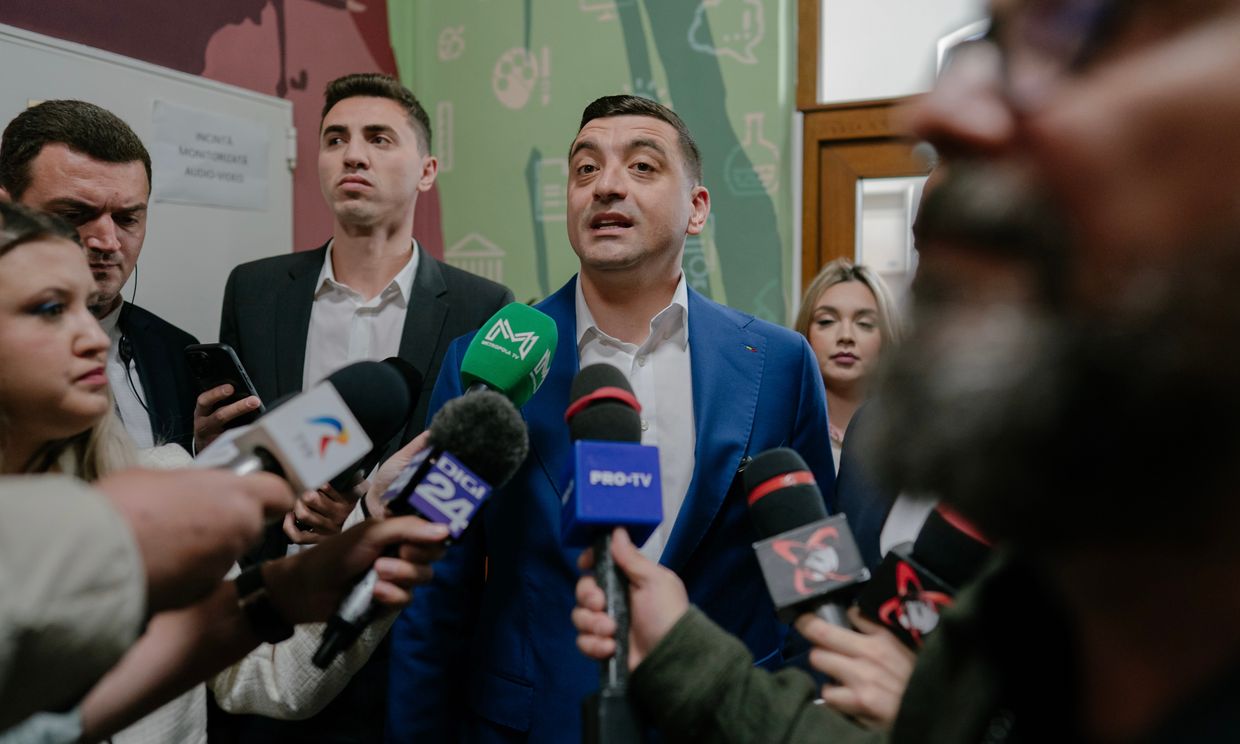
Presidential candidate George Simion talks to the media on the day of the presidential election, in Mogosoaia, Romania. (Andrei Pungovschi / Getty Images)
“I officially ask the Constitutional Court to annul the Romanian presidential elections for the same reasons the December elections were annulled: external interferences by state and non-state actors,” Simion wrote on X. Simion cited a post from Telegram CEO Pavel Durov, who claimed a “Western European government” asked the company to restrict “conservative voices in Romania.”
Romania’s previous presidential election, held in November 2024, was annulled by the Constitutional Court following evidence of foreign manipulation, including pro-Russian disinformation campaigns.
EU Diplomatic Service Restructuring: Sanctions Focus
The European Union is preparing to downsize its diplomatic service — the European External Action Service (EEAS) — and redirect funds toward strategic interests such as enforcing sanctions against Russia, POLITICO reported on May 20.
According to a document reviewed by POLITICO and confirmed by two officials familiar with the matter, the EU is scaling back operations at 10 foreign delegations and laying off around 100 local staff as part of budget reductions and a broader restructuring.
As part of the restructuring, delegations in countries linked to Russia’s “shadow fleet” could see staff increases, according to one official familiar with the plans. Meanwhile, delegations in countries where the EU no longer sees a strong need for a large diplomatic presence, such as Belarus or Lesotho, will likely be targeted by budget reductions.
The plan, proposed by Kaja Kallas, the EU’s High Representative for Foreign Affairs and Security Policy, was presented to senior European Commission officials on May 14 and has been approved for implementation over the next two years.
Ukraine Proposes Free Trade Agreement with US
President Volodymyr Zelensky has proposed a free trade agreement between Ukraine and the U.S. to President Donald Trump, Deputy Economy Minister and Trade Representative Taras Kachka said on May 20.
According to Kachka, Zelensky offered an agreement in a letter to Trump, alongside mentioning other opportunities for cooperation in trade and the defence industry. “This, accordingly, will be the next stage of our conversations,” Kachka said during a conference in Ukraine’s capital.
Kyiv is interested in such an agreement, despite the fact that the U.S. is not Ukraine’s largest trading partner, he added. “We are interested in free trade agreements with all G7 countries. That is, we have (agreements) with Britain, Canada, and the European Union. We also need the United States and Japan,” he said.
Ukraine and the U.S. launched initial talks on a free trade zone back in 2021. Ukrainian trade with the U.S. has dropped in recent years, with only $874 million of exports and $3.4 billion of American imports last year. In early April, Trump imposed a 10% tariff on all Ukrainian goods, except metal products, which had already been subject to a 25% tariff in March.
Rubio Defends Trump Administration’s Ukraine Policy
US Secretary of State Marco Rubio testified before Senate committees on May 20, defending the administration’s Ukraine policy as “moving decisively” to end the war. Rubio appeared before the Senate Foreign Relations and Senate Appropriation Committees to discuss the State Department’s budget.
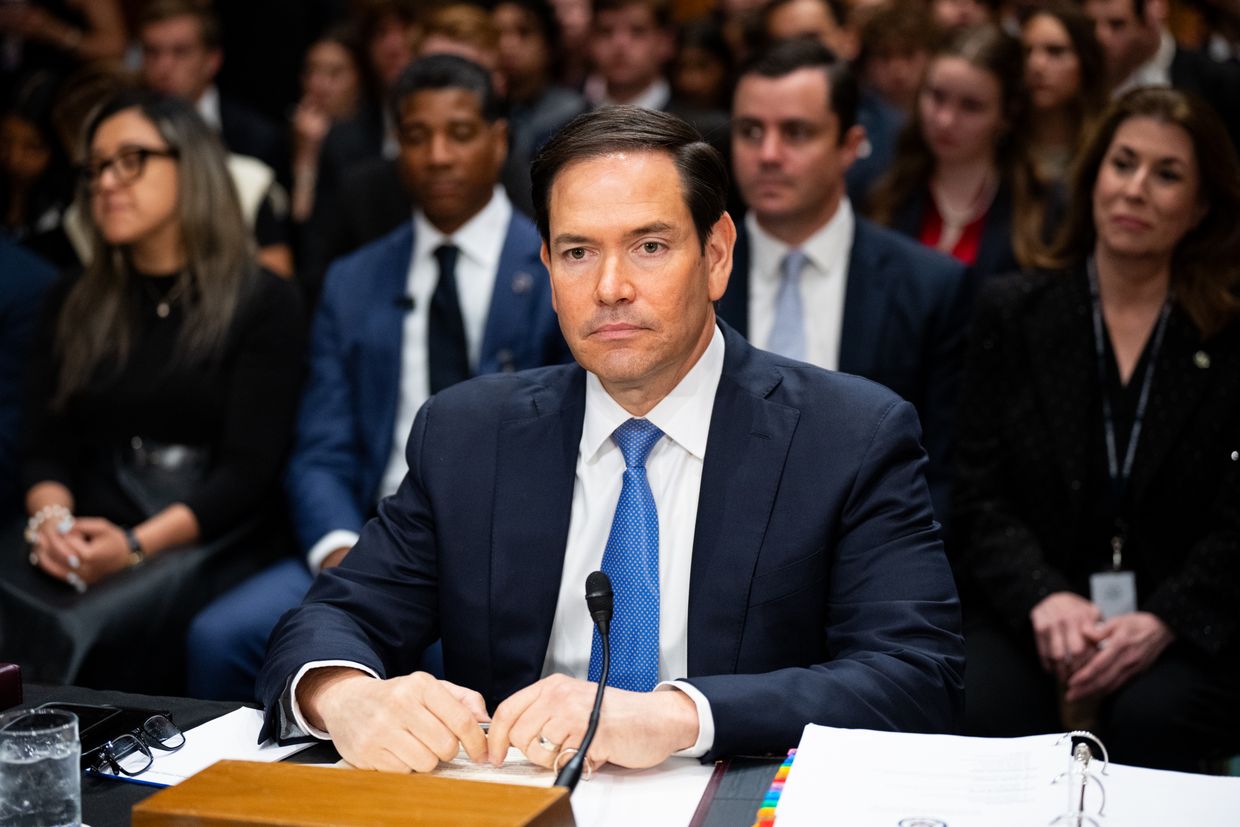
Secretary of State Marco Rubio prepares to testify during the Senate Foreign Relations Committee hearing in the Dirksen Senate Office Building. (Bill Clark / via Getty Images)
“Today, America is back. Secure borders, safe communities, and zero tolerance for criminal cartels are once again the guiding principles of our foreign policy,” Rubio told senators, according to his prepared testimony.
Rubio highlighted that the State Department “has taken President Trump’s policy message across Europe, securing the NATO Secretary General’s commitment to increased defense spending, recalibrating transatlantic political and economic relations to better serve American interests, and alongside Special Envoy Steve Witkoff, moving decisively to end the Ukraine war.”
His appearance before the committees comes just a day after the Trump-Putin call, during which the Kremlin again refused to agree to a ceasefire despite pressure from Ukraine and its European allies. Rubio’s defense comes amid concerns from several high-ranking senators following the resignation of US Ambassador to Ukraine Bridget Brink, who criticized the Trump administration’s policy of putting “pressure on the victim, Ukraine, rather than on the aggressor, Russia.”
